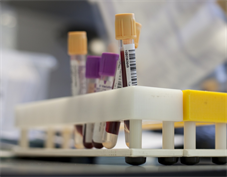International Clinical Trials Day 2021
20 May 2021 - Celebrating COVID-19 clinical trials and studies on International Clinical Trials Day

Since March 2020, the COVID-19 pandemic has swept across the world with over 163 million confirmed cases so far. Caused by the Sars-Cov-2 virus, for many COVID-19 is similar to a bad cold that can be treated at home, however it can also lead to severe complications such as pneumonia, stroke and kidney failure, and in some cases can be fatal. In the UK alone, there have been almost 4.5 million confirmed cases and over 127,000 deaths.
To combat this new virus and the disease it causes, scientists, clinical researchers and the wider research community have rapidly come together to deliver a huge number of clinical trials and studies that aim to target all aspects of the disease.
Research staff at King’s College Hospital have to date worked on 57 COVID-19 clinical trials and studies – most of which are still active – and have enrolled well over 3,000 participants.
Our staff have proudly played a pivotal role in research into COVID-19, all whilst treating patients with the disease on the front line. Below are just some of the research highlights from the past year.
Happy International Clinical Trials Day!
There are many more clinical trials and studies ongoing at the Trust that will provide important information in the diagnosis, treatment, management and prevention of COVID-19. For example, the Trust has recruited a large number of people into the GenOMICC study, which looks at genetic clues as to why some people are sicker than others with the disease. Additionally, the PHOSP-COVID study, led by Jon Breeze from the Cardiology Research Delivery Unit, has recruited 120 participants and analyses the long-term health implications COVID-19. Already it has found that 7 in 10 people hospitalised with COVID-19 suffer long-term effects, also known as ‘Long Covid’.
Through clinical trials and studies, we can learn how best to tackle COVID-19 and treat the patients we see with the disease. In the last year, staff across the Trust have come together and adapted to this unprecedented challenge and, as shown above, we are already beginning to see the powerful impact that we can have on the pandemic.
